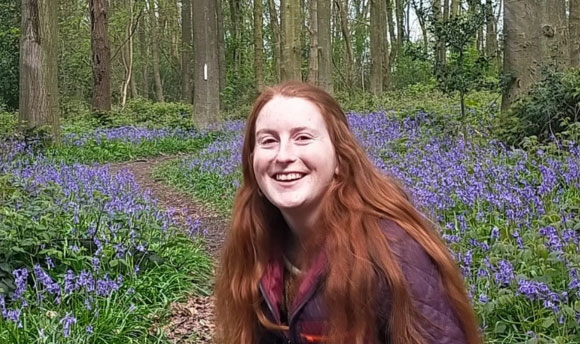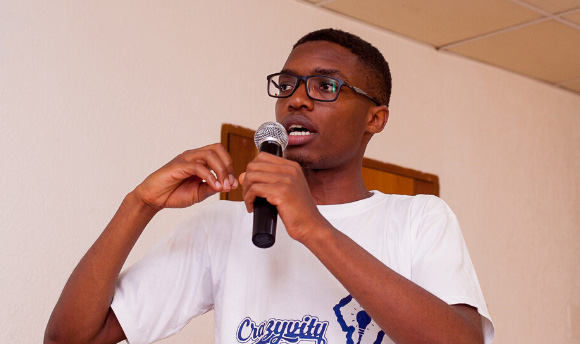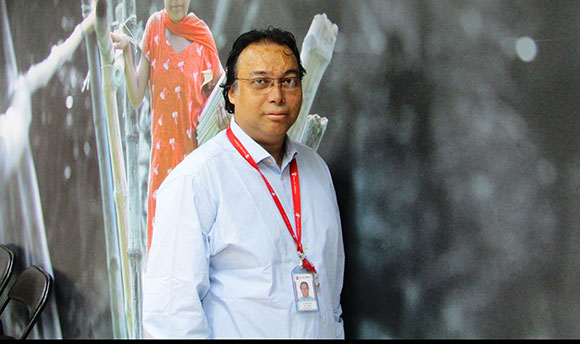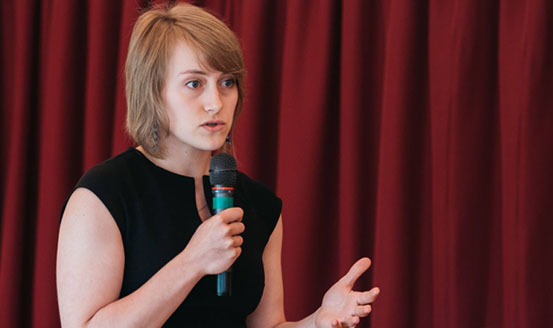- This course is still available for entry in September 2025.
- International applications close for the September intake on the 30 June 2025 for all applicants who would require to be sponsored on a Student visa to study here.
Global Health - MSc
Do you want to make a difference to the health of people in global settings? Are you passionate about social justice or looking for a qualification designed to enable you to work at a senior level in health policy and practice in the UK or abroad, particularly in low-income and middle-income settings? This MSc in Global Health could be the perfect stepping stone for your career.
Global health is increasingly being framed as a major driver of development, international co-operation and diplomacy, both during and beyond health emergencies such as the COVID-19 pandemic. This makes it not only a very interesting field of study, but also an incredibly important one, regardless of the setting you will work in. The MSc in Global Health course will offer you a thorough grounding in this multidisciplinary field, with the opportunity to specialise your studies if you wish later on.
The course is relevant to those working, or planning to work, in enhancing population health globally, particularly in low or middle-income settings, be this within governmental (eg ministries of health), non-governmental or intergovernmental organisations (eg WHO or UN agencies).
The course can be studied full time or part time.
Please note that this course is going through a routine review process over the next year and that any changes to course content arising will be reflected on this web page.
Why QMU?
- Unique academic institution: The Institute for Global Health and Development (IGHD) at QMU offers a range of postgraduate courses aimed specifically at those who wish to work in health policy and practice, particularly in low-income and middle-income settings.
- Make a difference to your career and to others' lives: Our courses put a strong focus on the social aspects of health and on health systems strengthening from a community-based perspective. They will equip you to assist in improving the lives of the most vulnerable people in the world, whether that be overseas or locally in Scotland. You will develop a strong understanding of current global health and development issues and will equip yourself with the tools you need to forge positive change locally, nationally or internationally.
- Access to expertise and industry connections: You will learn from experienced figures in the field and make connections that could last your whole working life. At IGHD we work directly with ministries of health, international and national organisations and local communities to develop real solutions to health and development problems. We have links with various bodies, including the following:
- Health Systems Global
- Mental Health and Psychosocial Support Network
- Scottish International Development Alliance
- Development Studies Association
- Scottish Government
- Scottish Refugee Council
- At QMU we hosted the NIHR Research Unit on Health in Situations of Fragility (RUHF) and we are part of the UK FCDO-funded project ReBUILD for Resilience.
- Join us on our compassion mission: Our work at IGHD addresses the health and wellbeing of those in greatest need, whether that be vulnerable populations in Scotland or those living in low-income or middle-income countries.
- Wide ranging teaching and research expertise: Our teaching and research expertise spans multiple aspects of global health and development. These range from health financing, support to fragile and conflict-affected settings, to refugee integration and child protection. Our teaching team brings to the classroom case-studies and reflections from their experiences in different global settings including Latin America, the Middle-East and Africa.
Interview with MSc Global Health student, Nkwain Carlson
How can societies implement more effective intervention strategies to improve access, affordability and quality of health services, especially for vulnerable populations? Who is responsible for initiating and then delivering the strategy in a low-income setting?
The answers to most of the important questions in this field are complex and your studies will prepare you to answer them through a multidisciplinary approach. This is about gaining a truly global perspective on the state of people’s health, and enhancing your knowledge through a systematic examination of health problems and their determinants.
The MSc in Global Health course will equip you to work effectively at a senior level to promote the health and social wellbeing of populations through the development of effective and responsive health systems. It will orient you to issues on which Institute staff are recognised to have made world-leading research contributions, such as supporting health systems strengthening in fragile and conflict-affected states, and mental health and psychosocial support for vulnerable populations.
Participants are typically drawn from a broad range of backgrounds, including physicians, nurses, allied health professions, development and humanitarian workers as well as health ministry and NGO employees.
Structure and exit awards
You can opt to study for the full MSc (180 credits), a PgDip (120 credits) or a PgCert (60 credits).
You can also register as an associate student to complete a single module for CPD. On completion of a single module, you may wish to complete further modules and progress your studies to a named award. A variety of modules can be studied for CPD, for example: Psychosocial Interventions for Displaced Populations or Forced Displacement and Integration Module.
Contact IGHD for more information.
Teaching, learning and assessment
Teaching is comprised of a combination of lectures, seminars, tutorials, case studies, simulation exercises and projects. Assessment is continuous and incorporates essays, action plans, projects and presentations. For your dissertation project, you can choose to do a desk-based study involving a literature review or conduct primary data collection in collaboration with national or international organisations working in global health and development.
Teaching hours and attendance
Your exact attendance requirements at QMU will depend on the module you are studying and whether you are studying full time or part time. In addition, for each module students spend approximately 10-12 hours of each week on preparing class work independently and with colleagues, including readings and exercises available on dedicated web-based learning platforms.
Class sizes
We expect approximately 20-25 students to enrol for this course each year.
Teaching staff
You can read more about the teaching staff on this course at the bottom of this page. Please note that teaching staff is subject to change.
PgCert
For the award of PgCert, you will complete the following modules:
- Global Public Health and Social Policy (20 credits) (core module): this module equips you with the knowledge and skills to better understand the impact of globalization on the health of populations in high-, middle-, and low-income settings. It also discusses the possible ways of engagement in the global health field through public health and social policy, based on a social justice approach to global health.
- Health Systems, Services and Communities (20 credits) (core module): this module aims to provide you with an overview of the current challenges and policy debates in local/national/global responses aimed to strengthening health systems, designing appropriate health system interventions and meeting the health needs of populations globally, including those affected by or recovering from instability and conflict.
- Global Health Research (20 credits) (core module): this module aims to problematise the production and evaluation of research knowledge and evidence in global public health and development, to contextualise methodological debates in relation to epistemology, theory and methods, and to critically reflect on the collection, analysis and appraisal of data and evidence relevant for global health and development priorities, programmes and policies.
NB Part-time students leaving after completing modules but not the three specified core modules will be awarded the PgCert Global Health and Development.
PgDip
For the award of PgDip, you will complete the modules listed for the PgCert, plus four elective modules. IGHD elective modules may include:
- Health Systems in Fragile Settings
- Project Design and Management
- Psychosocial Interventions for Displaced Populations
- Community-based Psychosocial Support
- Forced Displacement and Integration
- Research Proposal Writing
- Global Approaches to Gender and Health
- Sexual and Reproductive Health
- Sexual Health Rights: Policy and Programming in Practice
MSc
To complete the MSc students must, in addition to the above prerequisites, you will also complete a Dissertation (60 credits) involving desk study or fieldwork on an approved topic related to global health.
A further 60 credits of study is also required from the broad range of modules available within IGHD, other QMU courses or external universities.
This course could be a major turning point in your career. You will be ideally equipped for employment as a global health practitioner, senior health manager or policy maker working in, or advising, a developing country or one in economic transition.
Entry requirements
A UK honours degree or equivalent from a relevant subject area (arts, humanities, health or social sciences). Students without an honours degree may be considered if they have other relevant qualifications and/or appropriate work experience.
International students: You will be required to provide evidence of English language competence at no less than IELTS 6.0 with no individual component score less than 5.5.
Disability/health conditions
If you have a disability, long-term physical or mental health condition, or learning disability, it should not stand in the way of your studying at QMU. However, if you are not sure whether your disability might be a barrier in your studies or in relation to the professional standards, please contact the disability service who will be able to have a conversation with you about reasonable adjustments and supports available to you.
Applying for this course
For more information on applying, or to apply for this course, please follow the links in the 'Start your application' box at the top right of this page.
Application deadline
Home students: August for a September 2025 start and December for a January 2026 start.
International students: End of June for a September 2025 start and November for a January 2026 start.
Contact Admissions or contact IGHD for more information.
International applicants may apply for a competitive Commonwealth Scholarship.
- The delivery of this course is subject to the terms and conditions set out in our 2025/26 Entry - Terms and Conditions (Postgraduate).
- The information on this page is correct at the time of posting (October 2024) but is subject to change following a routine re-validation. In the event that modules change, QMU will seek to use reasonable endeavours to ensure that there is no detrimental impact on students. Please keep an eye on this page for updates.
Interview with MSc Global Health student, Casadra Otto Varhaug
Become your best you: study at QMU
Course Overview
Engage with the Team
A Student Story (see bottom of page for more)
“The MSc Global Health is a much needed degree for any professional who wants to build a career in the health development sector, both in and beyond their own country. I was drawn to the key aspect of this course, which focuses on health systems management globally, particularly in fragile and post-conflict areas."
Read my storyJoin us at one of our Postgraduate Open Events
Find out about online and in-person opportunities to meet with us to find out more about our postgraduate courses and study at QMU.
Postgraduate Open Events - More Info and Bookings











